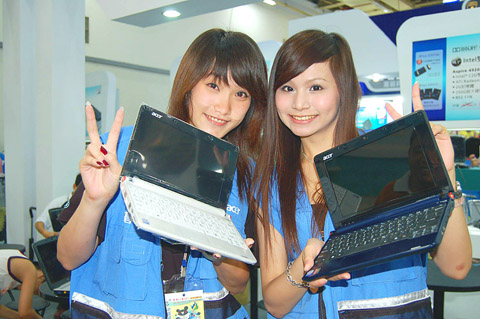With competition stiffening on the low-cost notebook market, both Asustek Computer Inc (華碩電腦) and Acer Inc (宏碁) said they would team up with international telecommunications service providers to offer free “netbooks” to customers who sign two-year contracts.
Asustek said it would forge a partnership with Japanese operator E-Mobile to offer its Eee PC 701 for US$0.91 to customers who sign up for two-year contracts. The company is already working with Europe’s T-Mobile to provide similar incentives and it said yesterday more such partnerships would be announced later.
ESTIMATED BOOST

PHOTO: SU CHIN-FENG, TAIPEI TIMES
Asustek said it believed telecom service providers could account for 20 percent of Eee PC shipments this year.
Acer also plans to offer its AspireOne models through similar two-year contract-bundled service plans worldwide, the company said yesterday.
At an investors conference on Wednesday, Asustek chief executive officer Jerry Shen (沈振來) reiterated the company’s full-year shipment target of 5 million Eee PCs, despite the company’s lackluster second-quarter results.
Although shipments in the first half of the year were less than 2 million units and there are only four months left in the year, “meeting the 5 million mark isn’t that far of a stretch, because typically there is a 4-to-6 ratio in PC sales,” meaning 60 percent of sales occur in the second half, Kirk Yang (楊應超), former head of Asian technology hardware research at Citigroup, said yesterday.
ACER GOAL
As for Acer, Yang said he was optimistic about the company’s projection of shipping 5 million AspireOne units by the year’s end, even though the company started marketing AspireOne only recently.
Sales of units through service provider partnerships will be booked as revenue in the first year, the companies said.
Many analysts’ forecasts for consumer electronics in the second half of the year are pessimistic, but sales of notebooks — and especially the low-priced, smaller notebooks that have been dubbed “netbooks” — are expected to remain bright, Topology Research Institute (拓墣產業研究所) president Eric Chang (張光平) said at an industry conference on Thursday.
The optimism is drawing new competitors, with Hewlett Packard, Dell and Lenovo joining the netbook market this month.
TIGHT RACE
Competition is expected to be fierce, but with the total market estimated at 10 million to 12 million units per year, Asus and Acer are set to maintain their dominance of the market.
“It would not be surprising if other firms begin to pull out of the netbook market by next year and focus on their core business,” Yang said.
In a research note earlier this week, Citigroup analyst Eve Jung (戎宜蘋) said netbook sales exhibited strong revenue growth, but gross margins should erode because of fierce price competition and excessive marketing spending.
Moreover, Jung was cautious on Asustek’s outsourcing plan, which she said may not perform well if too many models are offered and none reach maximum capacity to take advantage of economies of scale.
On Wednesday, Asustek said it planned to outsource 30 percent of its total notebook and Eee PC production next year.

A proposed 100 percent tariff on chip imports announced by US President Donald Trump could shift more of Taiwan’s semiconductor production overseas, a Taiwan Institute of Economic Research (TIER) researcher said yesterday. Trump’s tariff policy will accelerate the global semiconductor industry’s pace to establish roots in the US, leading to higher supply chain costs and ultimately raising prices of consumer electronics and creating uncertainty for future market demand, Arisa Liu (劉佩真) at the institute’s Taiwan Industry Economics Database said in a telephone interview. Trump’s move signals his intention to "restore the glory of the US semiconductor industry," Liu noted, saying that

On Ireland’s blustery western seaboard, researchers are gleefully flying giant kites — not for fun, but in the hope of generating renewable electricity and sparking a “revolution” in wind energy. “We use a kite to capture the wind and a generator at the bottom of it that captures the power,” said Padraic Doherty of Kitepower, the Dutch firm behind the venture. At its test site in operation since September 2023 near the small town of Bangor Erris, the team transports the vast 60-square-meter kite from a hangar across the lunar-like bogland to a generator. The kite is then attached by a

Foxconn Technology Co (鴻準精密), a metal casing supplier owned by Hon Hai Precision Industry Co (鴻海精密), yesterday announced plans to invest US$1 billion in the US over the next decade as part of its business transformation strategy. The Apple Inc supplier said in a statement that its board approved the investment on Thursday, as part of a transformation strategy focused on precision mold development, smart manufacturing, robotics and advanced automation. The strategy would have a strong emphasis on artificial intelligence (AI), the company added. The company said it aims to build a flexible, intelligent production ecosystem to boost competitiveness and sustainability. Foxconn

STILL UNCLEAR: Several aspects of the policy still need to be clarified, such as whether the exemptions would expand to related products, PwC Taiwan warned The TAIEX surged yesterday, led by gains in Taiwan Semiconductor Manufacturing Co (TSMC, 台積電), after US President Donald Trump announced a sweeping 100 percent tariff on imported semiconductors — while exempting companies operating or building plants in the US, which includes TSMC. The benchmark index jumped 556.41 points, or 2.37 percent, to close at 24,003.77, breaching the 24,000-point level and hitting its highest close this year, Taiwan Stock Exchange (TWSE) data showed. TSMC rose NT$55, or 4.89 percent, to close at a record NT$1,180, as the company is already investing heavily in a multibillion-dollar plant in Arizona that led investors to assume